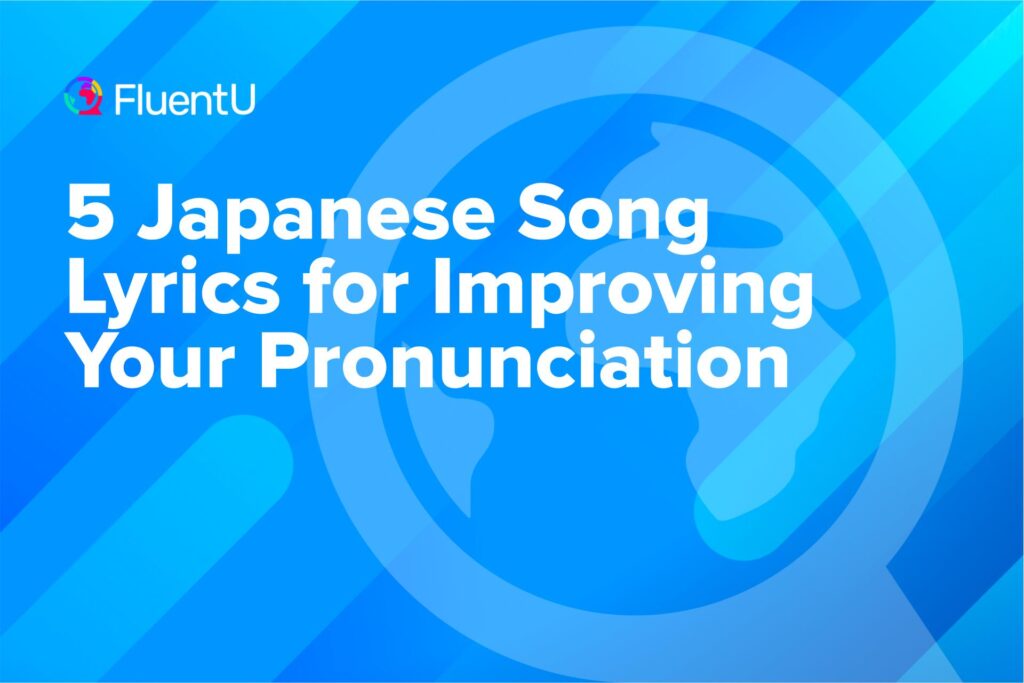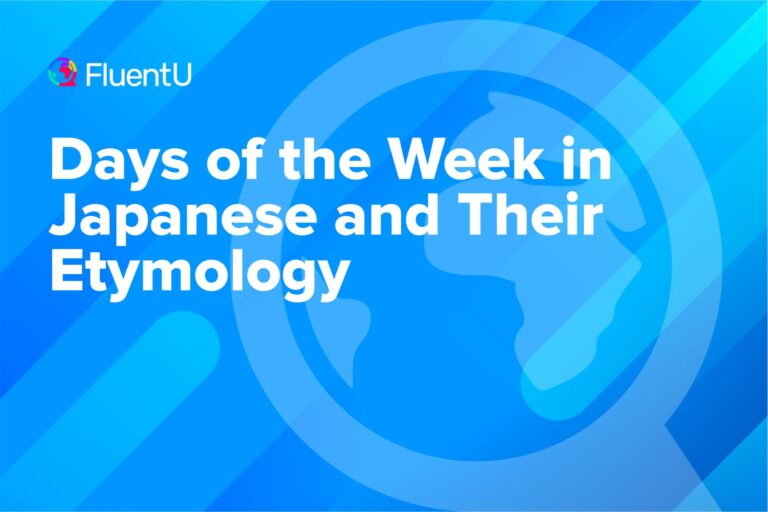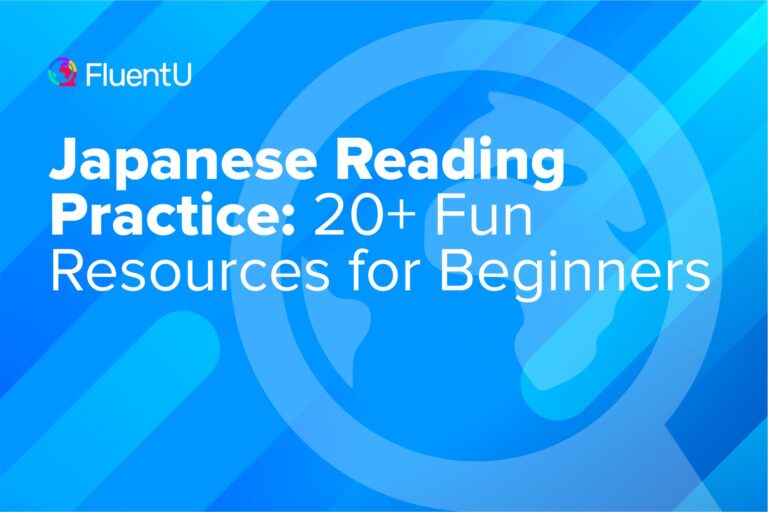5 Japanese Song Lyrics for Improving Your Pronunciation

Knowing Japanese song lyrics by heart makes it easy to sing along at the karaoke bar, burst into song when alone in your car and chat about pop culture with your language partner. But it can also help you improve your pronunciation, learn new words and pick up on grammar structures.
But before you jump into the deep end, start by wading with some simple songs that anyone can learn by heart.
In this post, I give you my five favorite songs for learning Japanese song lyrics that anyone—regardless of level—can master.
Download: This blog post is available as a convenient and portable PDF that you can take anywhere. Click here to get a copy. (Download)
1. “おめでとうクリスマス”
Hiragana: おめでとう くりすます
English: “We Wish You a Merry Christmas”
This is a song that most of you will already be familiar with.
The entire song has only five different lines, making it one of the simplest. And most of them contain the line “おめでとうクリスマス.”
So, you can see how this is a perfect song for beginners—simple yet polite language, lots of repetition and a context you’ll likely be familiar with.
What can be learned from this song?
- Phrases you can use around holiday time
- The appropriate use of おめでとう, which tends to be used in the case of holidays. For example: 誕生日おめでとう (たんじょうび おめでとう — Happy birthday) or to congratulate someone for a significant life event.
- Grammar points with みんなして, which is another way to say みんなで, 一緒に (いっしょに) or 一斉に (いっせいに). They both mean more than one person is doing something together simultaneously.
- How to use ましょう, which is the polite form for proposals in Japanese.
Before we move on, here’s some trivia for anime lovers: A version of this song was included on a “Sailor Moon” Christmas album entitled “Christmas For You.”
If you’re a Minako fan, this should be a delightful discovery for you as she’s singing it. There’s a talking bit in the middle, making for extra listening practice!
歌詞 (かし) — Lyrics
おめでとうクリスマス
(おめでとう くりすます) – repeated three times
Merry Christmas
お祝いしましょう
(おいわいしましょう)
Let’s celebrate
みんなして遊びましょう
(みんなして あそびましょう)
Let’s have a good time with everyone
おめでとうクリスマス
(おめでとう くりすます)
Merry Christmas
お祝いしましょう
(おいわいしましょう)
Let’s celebrate
おめでとうクリスマス
(おめでとう くりすます) – repeated three times
Merry Christmas
お祝いしましょう
(おいわいしましょう)
Let’s celebrate
みんなして遊びましょう
(みんなして あそびましょう)
Let’s have a good time with everyone
おめでとうクリスマス
(おめでとう くりすます)
Merry Christmas
お祝いしましょう
(おいわいしましょう)
Let’s celebrate
おいしいお菓子を
(おいしい おかしを) – repeated three times
Delicious treats
作りましょう
(つくりましょう)
Let’s make
みんなして遊びましょう
(みんなして あそびましょう)
Let’s have a good time with everyone
おめでとうクリスマス
(おめでとう くりすます)
Merry Christmas
お祝いしましょう
(おいわいしましょう)
Let’s celebrate
おめでとうクリスマス
(おめでとう くりすます) – repeated three times
Merry Christmas
お祝いしましょう
(おいわいしましょう)
Let’s celebrate
みんなして遊びましょう
(みんなして あそびましょう)
Let’s have a good time with everyone
おめでとうクリスマス
(おめでとう くりすます)
Merry Christmas
お祝いしましょう
(おいわいしましょう)
Let’s celebrate
2. “鬼のパンツ”
Hiragana: おにの ぱんつ
English: “The Ogre’s Underpants”
This song is about the underpants worn by a type of youkai known as oni, and just how strong these underpants are. Oni can also be translated as demon, devil, troll or monster.
If the video didn’t make it obvious, this is a song aimed at children. But it’s probably the most fantastical, out-there song on the list (which makes it a bit more fun) and can help you learn about Japanese lore.
Not only that, but you’ll be able to connect more with other cultural staples involving oni. For example, one of the most popular customs of Setsubun involves wearing an oni mask!
What can be learned from this song?
- Three verbs:
- Use of the casual form of ましょう that shows up with 履こう . We explain how exactly this works in this guide.
- Another casual speech tick is also used: The sentence ending ぞ, which is similar to よ but is considered masculine and possibly stronger in its emphasis than よ.
- Loads of great vocabulary:
And like last time, here’s some trivia: The melody of the song comes from Neapolitan/Italian song “Funiculì, Funiculà” composed by Luigi Denza. Sound familiar? It does to me, but I can’t put my finger on exactly why that is, somehow. Hmm…
歌詞 (かし) — Lyrics
鬼のパンツはいいパンツ
(おにの ぱんつは いい ぱんつ)
The ogre’s underpants are good underpants
強いぞ強いぞ
(つよいぞ つよいぞ)
They’re strong, they’re strong
鬼のパンツはいいパンツ
(おにの ぱんつは いい ぱんつ)
The ogre’s underpants are good underpants
履こうよ履こうよ
(はこうよ はこうよ)
Let’s wear them, let’s wear them
5年たっても破れない
(ごねん たっても やぶれない)
Even after five years they’re not worn out
強いぞ、強いぞ
(つよいぞ つよいぞ)
They’re strong, they’re strong
10年たっても破れない
(じゅうねん たっても やぶれない)
Even after ten years they’re not worn out
強いぞ、強いぞ
(つよいぞ つよいぞ)
They’re strong, they’re strong
履こう、履こう、鬼のパンツ
(はこう はこう おにの ぱんつ)
Let’s wear them, let’s wear them, the ogre’s underpants
履こう、履こう、鬼のパンツ
(はこう はこう おにの ぱんつ)
Let’s wear them, let’s wear them, the ogre’s underpants
あなたも、私も
(あなたも わたしも)
You too, me too
あなたも、私も
(あなたも わたしも)
You too, me too
みんなで履こう、鬼のパンツ
(みんなで はこう おにの ぱんつ)
Let’s all wear them, the ogre’s underpants
3. “もしも自由が欲しいなら”
Hiragana: もしも じゆうが ほしいなら
English: “If You Want Freedom”
You’ll like this song if you like music that’s more on the jazzy side.
Mayumi Kojima’s music tends to be in this style, so if you like what you hear, I recommend looking into her catalog. (And don’t worry, I’ll help you with specific recommendations later.)
Her music also sets a delightful mood for learning if you like sweet, quaint-feeling music.
I has more day-to-day in its vocabulary, and it also has clear, simple language one would likely use in everyday speech.
The spirit of this song is captured in much of her other work, so her discography is worth exploring for more great lessons!
What can be learned from this song?
- Conditional sentence forms that use もし (も) and なら (ば), explained here by Tae Kim’s Guide to Japanese.
- How to say “must” or “need to” with the verb ending なきゃ . Once again Tae Kim has a guide on this, as does Maggie Sensei.
- Three verbs:
- The words:
- How to say “want” in Japanese, using 欲しい (ほしい).
As you can see, this song can teach you a lot of commonly used Japanese grammar.
I suggest sentence mining songs like these—which means studying it line-by-line, noting every structure and unknown word—or using an immersion program like FluentU that lets you learn with videos and interactive subtitles.
FluentU takes authentic videos—like music videos, movie trailers, news and inspiring talks—and turns them into personalized language learning lessons.
You can try FluentU for free for 2 weeks. Check out the website or download the iOS app or Android app.
P.S. Click here to take advantage of our current sale! (Expires at the end of this month.)

Here’s another song by Mayumi I recommend:
「私の恋人」 (わたしの こいびと) — “My Lover“
A song about one’s lover, as well as going on boat rides, a trip to another country and to dance parties with them. This is another relatively simple song that you may want to add to your “Songs to Learn” list.
歌詞 (かし) — Lyrics
もしも自由が欲しいならば
(もしも じゆうが ほしいならば)
If you want freedom
もしも自由が欲しいならば
(もしも じゆうが ほしいならば)
If you want freedom
このバスに飛び乗らなきゃ
(このばすに とびのらなきゃ)
This bus, you need to hop on
もしも今が欲しいならば
(もしも いまが ほしいならば)
If you want right now
もしも今が欲しいならば
(もしも いまが ほしいならば)
If you want right now
このバスに
(このばすに)
On this bus
飛び乗らなきゃ
(とびのらなきゃ)
You need to hop
飛び乗らなきゃ
(とびのらなきゃ)
You need to hop
時間を忘れて
(ときをわすれて)*
You forget the time
時間を忘れて
(ときをわすれて)*
You forget the time
このバスは
(このばすは)
This bus
あなたを待つ
(あなたをまつ)
You’ll wait for
あなたを待つ
(あなたをまつ)
You’ll wait for
もしも自由が欲しいならば
(もしも じゆうが ほしいならば)
If you want freedom
もしも自由が欲しいならば
(もしも じゆうが ほしいならば)
If you want freedom
このバスに
(このばすに)
On this bus
飛び乗らなきゃ
(とびのらなきゃ)
You need to hop
飛び乗らなきゃ
(とびのらなきゃ)
You need to hop
*Note: On some lyric sites, the first line in verse three is written as 時間を忘れて (じかんをわすれて), although it’s read as ときをわすれて.
This 時間 is the 熟字訓 (じゅくじくん — special kanji readings), which is a Japanese word whose kanji spelling conveys the meaning based on the individual characters, but the reading isn’t directly related to the spelling.
The 熟字訓 are often used in literature.
4. “いつか王子様が ”
Hiragana: いつか おうじさまが
English: “Someday My Prince Will Come”
There’s nothing quite like 「白雪姫」(しらゆきひめ — Snow White) to lift your spirits.
The greatest part about this song is that it’s not the only Disney song with a Japanese rendition.
From what I can tell, Disney movies are usually dubbed before their cinematic release in Japan. So go seek out Japanese versions of other Disney songs you love!
Personally, I am very fond of the Japanese versions of “The Nightmare Before Christmas” songs, like “This is Halloween” and “What’s This?” Of the non-spooky variety, “Be a Man” is pretty good and pretty funny, and “Cruella de Vil” is nice for its simplicity and the humor involved in the scene.
What can be learned from this song?
- Tons of vocabulary. Every word is useful in some way!
- Kanji for all the vocabulary you’ll learn from this song.
- Use of になる , which in this context means “to be” or “to become.” The example in this song is pretty good for showing how it can work because Snow White is speaking mainly in the future tense about her prince and how she sees herself being happy then.
- Use of でしょう to indicate that a certain outcome is likely.
- Use of ていく , which modifies a verb to mean “to go do (something).” Maggie Sensei has a lot of examples here.
- Use of な adjectives, which are named for the use of な after certain adjectives when placed before a noun.
歌詞 (かし) — Lyrics
とても素敵な王子様
(とてもすてきな おうじさま)
A very lovely prince
いつか必ず王子様が
(いつかかならず おうじさまが)
Someday, for sure, the prince
私を見つけ出し
(わたしをみつけだし)
Will find me
お城へ連れていく
(おしろへつれていく)
Take me away to his castle
いつか必ず幸せになる
(いつか かならずしあわせになる)
Someday, for sure, I’ll be happy
永久の愛の鐘が
(とこしえのあいのかねが)
Forever love’s bell
鳴りわたるでしょう
(なりわたるでしょう)
Will likely ring
5. “Ring a Ding Dong”
This cheery song by 木村カエラ (Kaela Kimura) is a great one to stick in your brain, and it’s got oodles of lessons to teach you.
What can be learned from this song?
- A way that onomatopoeias can be used. むにゃむにゃ (in this context, to talk while asleep) is paired with と (in this context, is similar to the way な is used after certain adjectives) so it can work in a sentence.
- Several verbs.
- さしてあげる (compound of two different words: さす, to hold an open umbrella, and あげる, to give)
- あがる (to stop, in the case of rain, or in this context, tears)
- 分け合う (わけあう — to share)
- くれる (to give something to someone)
- 言える (いえる — to be able to say)
- いる (to exist)
- 眠る (ねむる — to sleep, although suggesting someone may not be laying down)
- 開く (ひらく — to open, as in making a space where there may not have been before)
- 鳴り響く (なりひびく — to resound, in the case of something audible)
- 踊り出す (おどりだす — to break into dance)
- 歌い出す (うたいだす— to break into song)
- Lots of nouns.
- 天気 (てんき — weather)
- 雨 (あめ — rain)
- 空 (そら — sky)
- 晴れ (はれ — sunny or clear weather)
- 傘 (かさ — umbrella)
- 涙 (なみだ — tears)
- 言葉 (ことば — words)
- 天使 (てんし — angel)
- 代わり (かわり — substitute or replacement)
- 夢 (ゆめ — dream)
- ドア (どあ — door)
- ファンファーレ (ふぁんふぁーれ — fanfare)
- 誰も彼も (だれもかれも — any and everyone, one and all)
- 小鳥 (ことり — small bird or songbird)
- 花 (はな — flower)
- お日様 (おひさま — the sun)
- Various other words.
- The use of the curious word とまれ , which in this song is a bit perplexing because it could potentially have so many meanings, but it likely indicates an extended period or doing something regardless of circumstances. Hard to say exactly since it’s in Hiragana, though!
When I tried to remember this song’s lyrics, I used a karaoke video.
Karaoke really is helpful. You can read the lyrics in real-time and go back a few seconds if you need to without switching windows.
歌詞 (かし) — Lyrics
Ring a Ding Dong Ring a Ding Ding Dong – repeated eight times
Ding Dong
なんで?君の天気は雨?
(なんで?きみの てんきは あめ?)
Why? Is your weather rainy?
こんなにボクの空晴れだよ
(こんなに ぼくのそら はれだよ)
My sky is so very sunny
お気に入りのボクの傘を君にさしてあげるよ
(おきにいりの ぼくのかさを きみに さしてあげるよ)
My favorite umbrella I’ll hold over you
涙もあがれ
(なみだも あがれ)
And stop your tears
Ring a Ding Dong, Ring a Ding Ding Dong – repeated three times
みんな分け合うよ
(みんなわけあうよ)
We all share
Ring a Ding Dong, Ring a Ding Ding Dong – repeated three times
ドレミファミレド
(どれみふぁみれど)
Do Re Mi Fa Mi Re Do
君がいつもくれる言葉
(きみが いつも くれる ことば)
The words you always give me
天使も大好きだ「ありがと
(てんしも だいすきだ「ありがと」)
Angels also love them, “Thank you”
だからママ!ボクもちゃんと言えるよ
(だから まま!ぼくも ちゃんと いえるよ)
So Mama! I can say it right too
いつもありがと
Thank you always
幸せとまれ
(しあわせ とまれ)
Stay happy/Be happy no matter what
Ring a Ding Dong, Ring a Ding Ding Dong – repeated three times
代わりは いないよ
A replacement doesn’t exist
Ring a Ding Dong, Ring a Ding Ding Dong – repeated three times
ドレミファミレド
(どれみふぁみれど)
Do Re Mi Fa Mi Re Do
むにゃむにゃと眠る
(むにゃむにゃと ねむる)
Talking in my sleep
夢のドア開く
(ゆめの どあ ひらく)
The door I dream of cracks open
ファンファーレ鳴り響いて
(ふぁんふぁーれ なりひびいて)
A fanfare resounds
誰も彼も踊り出す
(だれもかれも おどりだす)
Everybody bursts into a dance
小鳥や花やボクも歌い出す
(ことりや はなや ぼくも うたいだす)
Songbirds, flowers and I all burst into song
お日様顔出してもうおはよう
(おひさま かお だして もう おはよう)
The face of the sun comes out, it’s already time to say good morning!
1・2・3・4・5・6
Ring a Ding Dong – repeated six times
I must warn you—this song is slightly more complicated than the others.
Although the speech is casual, and several simple words are used, there’s also some tricky stuff going on due to it being slightly poetic with some of the meanings, lots of words being stuffed into the bridge and having some wonky sentence structures.
But if you enjoy pop music, you may like this one more than others.
If you prefer more technical guidance, how about some lyric site recommendations?
My favorites are:
Adding 歌詞 (かし) to your search and making sure everything is written in at least kana can also really help bring up native sites.
There’s also this handy guide that talks about finding Japanese song lyrics with ease, which goes into far more detail than I do here. (And has more music recommendations!)
Are you feeling ready to seek out more simple songs now?
Or maybe get through these to see how you like learning the lyrics?
Then slip into your favorite music listening position, get your vocal chords ready, and learn those songs! And for more Japanese music, check out our post on the most famous Japanese singers and bands—it comes with plenty of song recommendations, too.
Download: This blog post is available as a convenient and portable PDF that you can take anywhere. Click here to get a copy. (Download)
And One More Thing...
If you love learning Japanese with authentic materials, then I should also tell you more about FluentU.
FluentU naturally and gradually eases you into learning Japanese language and culture. You'll learn real Japanese as it's spoken in real life.
FluentU has a broad range of contemporary videos as you'll see below:

FluentU makes these native Japanese videos approachable through interactive transcripts. Tap on any word to look it up instantly.

All definitions have multiple examples, and they're written for Japanese learners like you. Tap to add words you'd like to review to a vocab list.

And FluentU has a learn mode which turns every video into a language learning lesson. You can always swipe left or right to see more examples.

The best part? FluentU keeps track of your vocabulary, and gives you extra practice with difficult words. It'll even remind you when it’s time to review what you’ve learned. You'll have a 100% personalized experience.
Start using the FluentU website on your computer or tablet or, better yet, download the FluentU app from the iTunes or Google Play store. Click here to take advantage of our current sale! (Expires at the end of this month.)







